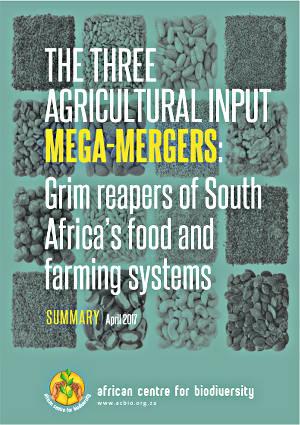Latest Resources

1 March 2018
A review of participatory plant breeding and lessons for African seed and food sovereignty movements
There is growing awareness of the unique and important role smallholder farmers around the world play in conserving, using and enhancing biodiversity. Conventional breeding has created a separation between farmers and specialised breeders. Participatory plant breeding (PPB) is a field of action developed over the past 25-30 years to overcome this separation, and reunite farmers […]

13 November 2017
Smallholder farmers score victory at international ‘Seed Treaty’ meeting
A landmark decision on the establishment of an Ad Hoc Technical Expert Group to realise farmers’ rights was recently taken by the seventh session of the Governing Body (GB7) of the International Treaty on Plant Genetic Resources for Food and Agriculture (ITPGRFA; also known as the ‘Seed Treaty’). There was stiff opposition from countries from […]

18 October 2017
Farm Input Subsidies and Civil Society’s Position in Mozambique
This statement represents the position of civil society in Mozambique on farm input subsidies.

16 October 2017
Civil society in Mozambique statement on farm input subsidies in that country
This statement represents the position of civil society in Mozambique on farm input subsidies in that country.

4 August 2017
Local seed varieties are essential for sustainable food systems … but face challenges
Smallholder farmers in Mozambique want access to a diversity of quality seed, but not exclusively from the formal sector. Farmers highly value their own varieties and want to work on enhancing these, too. These strong messages came out of a dialogue held between smallholder farmers, government officials and research institutions in Chimoio, Manica Province in […]

11 April 2017
Mega-mergers: 3 giant corporations controlling South Africa’s food and farming systems
This briefing deals with the three mega mergers taking place in the agriculture sector as Dow Chemical and DuPont are set to merge, China National Chemical Corporation (ChemChina) is to acquire Syngenta and Bayer is to acquire Monsanto. The proposed Bayer-Monsanto merger will give control of almost 30% of the world’s commercial seed market and […]

16 September 2016
Mapping farmer seed varieties in Manica, Mozambique: initial investigations into agricultural bio...
This scoping exercise to deepen our understanding of the current context of seed use, main crops and varieties in the research localities in order to gather evidence of the ongoing importance of farmer seed systems in the agricultural practices and livelihoods of smallholder farmers, to identify cases of biodiversity loss and to use this information […]

13 July 2016
Soil fertility: Agroecology and not the Green Revolution for Africa
This synthesis report summarises ACB’s research on the Green Revolution push in Africa, based on fieldwork conducted in Malawi, Mozambique, Tanzania, Zambia and Zimbabwe over the past three years. The research indicates that the promotion of synthetic fertiliser use in Africa is only a short-term fix for enhancing soil fertility on the continent. In the […]

24 October 2015
Investments in the Beira Corridor in Mozambique: threats to farmers’ seed and food systems
The African Centre for Biodiversity (ACB) in partnership with the União Nacional de Camponeses (UNAC, National Peasants Union), and Kaleidoscopio has today released preliminary findings in a research project: ‘Agricultural investment activities in the Beira Corridor, Mozambique: Threats and opportunities for small-scale farmers.’ Joining Zimbabwe, Zambia and Malawi to the coast of Mozambique, the Beira […]

30 August 2015
AFAP in Ghana, Mozambique and Tanzania—for profits or people?
The chemical fertiliser push in Africa and its implications for smallholder farmers is not receiving enough attention in current discourses concerning Green Revolution policies and practises in Africa. Yet chemical fertilisers are big business on the continent, where its adoption is strongly supported by African governments through subsidy schemes and regional organisations such as NEPAD, […]
